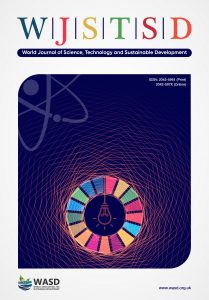Knowledge transfer for sustainable development: East-West collaboration?, Prof. Amer Al-Roubaie and Prof. Shafiq Alvi
Prof. Amer Al-Roubaie
College of Business and Finance
Ahlia University, Manama
Bahrain
Email: aalroubaie@ahlia.edu.bh
Prof. Shafiq Alvi
Concordia University, Montreal
Canada
DOI: 10.1108/WJSTSD-06-2014-0007
Purpose: The purpose of this paper is to discuss the potential impact that collaboration between East and West could have on sustainable development. Greater emphasis in this paper will be placed on the benefit that developing countries gain from building collaborative relations with the West. Obtaining access to knowledge and technology will enable developing countries to speed up the process of socio-economic transformation and sustain development. Developing countries can leapfrog by making use of the existing knowledge in the West.
Design/methodology/approach: This paper provides descriptive assessment of the relationship between East and West to foster growth and sustain development. The paper uses newly developed ideas to build capacity for knowledge transfer to create linkages and accelerate the process of economic growth. The approach to knowledge-based development requires the creation of an enabling environment driven by skills, innovation, institutions and ICT.
Findings: The paper suggests that knowledge transfer enables developing countries to sustain development. Access to global/western knowledge allows developing countries to diversify their economic structure and increase productivity. Technological learning and knowledge absorption permit these countries to leapfrog by surpassing several stages in their development.
Practical implications: Information in this paper provides insight into the merits of the new economy and the potential benefits that developing countries can obtain from participating in the global economy. Indigenous knowledge and local innovation are important for local development, which can be enhanced through technology transfer and knowledge dissemination.
Originality/value: Unlike traditional economic theories in which capital and labor provide the main inputs in production, this paper discusses a new approach to development where knowledge, skills and innovation represent the main forces behind growth. The paper explores new ideas to generate linkage and sustain development.
Keywords: Education; Innovation; Sustainable development; Technology; Development; Knowledge; Globalization; East; West.
Citation: Al-Roubaie, A. and Alvi, S. (2014), "Knowledge transfer for sustainable development: East-West collaboration?", World Journal of Science, Technology and Sustainable Development, Vol. 11 No. 4, pp. 242-255. https://doi.org/10.1108/WJSTSD-06-2014-0007

